Since I had lived with my Lang grandparents for over 8 years I knew them better than I did my Grandma and Grandpa Roliff. I am telling this story from what I remember and from the things my father told me.
The Roliff family originally lived near Ravenswood, West Virginia, close to the Ohio River. According to Dad, they moved more than 30 times before he was 17, at which time he left the family to strike out on his own. During this time my grandfather, Fred Roliff, did not have a regular job, nor did he want one. His grandfather, Andrew Jackson Roliff, owned two paddle-wheel steamers on the Ohio River and made a fortune selling and delivering barrel staves.
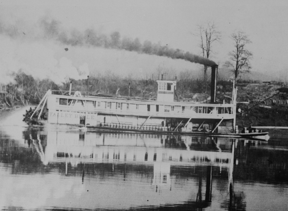
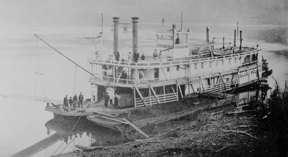
The Valley Belle – owned by Andrew Jackson Roliff – c. 1850
Somewhere along the line this wealth was squandered, but the attitude of entitlement remained with my grandfather. He was a very charming man and a good story teller, but hard work was beneath his dignity. Dad said his motto was, “Only Fools and Mules work”. His only occupation at the time was “horse-trading” which was about as dependable for making a living and supporting a family as being a gambler or used car salesman.
To add to the family stress, Grandpa Roliff was not very practical. Dad tells about the time Grandpa made some money selling a horse. Instead of paying the rent or buying some substantial food, he came home with a wagon-load of watermelons.
So here was the Roliff family with 7 kids, a horse-trader for a father, that moved every time the rent came due. It was Grandma Roliff’s job to keep this family together and to keep everyone from starving.
If anyone remembers Mammy Yokum from the Lil’ Abner comic strip they would have a good picture of my grandmother, Clementine Roliff. She had flaming red hair and the hardened look of someone who had lived a difficult life. Her ancestors were some of the original settlers of Appalachia who came from Wales and Scotland. She was the classic example of a tough mountain woman. Dad remarked that she could “chew nails and spit rust”. He recalls her chasing salesmen and rent-collectors from their property with a revolver.
One of the Roliffs’ last moves as a family took them to Portage County in Ohio, near Randolph. My father obtained a job in the Lang gas station-restaurant as a short order cook.
After the children grew up Fred and Clementine Roliff separated – I never knew the details. They didn’t appear to be angry with each other, it just seemed that they just didn’t want to live together.
After the separation Fred lived in a small apartment in Ravenna, did some house painting, and later was employed as a guard at the Ravenna Arsenal.
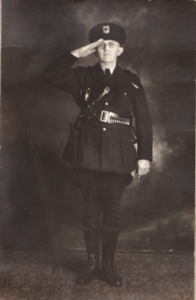
Fred “Grandpa” Roliff as Arsenal guard – c. 1943
Clementine had a bungalow in Brimfield and lived there with Uncle Emmett, her second youngest son, who had recently returned from the military.
When Emmett started a serious relationship with a girl, Grandma became worried that he was going to move out and she would be alone, so she was not very hospitable to Emmett’s new friend.
One day Emmett was looking around in the pantry and discovered a bottle of saltpeter.
Now saltpeter was used to preserve meat such as corned beef and prevent botulism in soups. There was also a rumor that it was mixed into food given to soldiers to cause impotence. Everyone at the time believed this, and Emmett was no exception – he was suspicious that Grandma was putting saltpeter in his food in an attempt to keep him at home and away from his girl. She was certainly capable of this, so he confronted her about it.
“It’s used to cure your meat”, Grandma told him in her own defense.
“It’ll cure your meat alright”, Emmett replied.
No one ever knew the real reason why the bottle of saltpeter was in the pantry or of its use, but nothing would surprise me concerning this incident. Grandma Roliff had a reputation of toughness when it came to her survival.
Grandma was a staunch Democrat and she hated Richard Nixon with a passion. As a matter of fact she had his picture glued to the inside of her toilet seat. She called him “Old hawg jaws”.
Emmett eventually moved out and Grandma acquired a boyfriend, but she didn’t want the family to know about this. While visiting her one day we suddenly heard some moaning and groaning coming from the closet. She had made the old boy hide in there so we wouldn’t discover her secret, but our visit lasted too long and the poor old guy almost suffocated. After the secret was exposed, friend Charlie was allowed to visit with us when we came, so from then on the closet was only used for clothes.
I often played bass with a dance band from Canton. One evening we played the Lakeview Cafe in Randolph. The crowd on this night was rather quiet and subdued. All of a sudden the door flew open and in came Grandma Roliff with 3 of her girl friends. They were all over the age of 60, but they danced like 20 year olds and the mood immediately went from subdued to wild and upbeat. They stayed for about a half hour, then out the door they flew and on to the next bar. The mood in the Lakeview Cafe immediately went back to quiet and subdued.
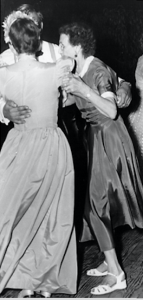
Clementine “Grandma” Roliff dancing at Ruth Roliff’s wedding – c. 1954
One time Dad and I went to visit Grandma at her place in Brimfield. We heard some loud singing and laughing coming from the back of the house. Grandpa Roliff and Uncle Bud were up on a scaffold painting the house, singing old hillbilly songs, laughing, and having a good old time. The singing went something like this:
Grandpa: “Rattler was a good old dog blind as he could be”
Bud: “Every night about supper time I believe that dog could see”
Both came in on the chorus:
” Here Rattler here, here Rattler here
Calling Rattler from the barn, here Rattler here”
Now they would start improvising:
Grandpa: “Rattler’s dead and gone now where all good dogs do”
Bud: “Better not act like a dog yourself or you will go there too”.
More singing, laughter, painting, etc, etc.
This was the last time I saw Grandpa Roliff alive. He had a heart attack and died in 1951 at the age of 66. Grandma Roliff died in 1977 at the age of 92. I don’t believe I will ever meet more colorful people than these two.

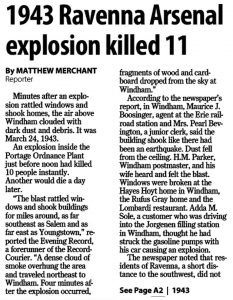
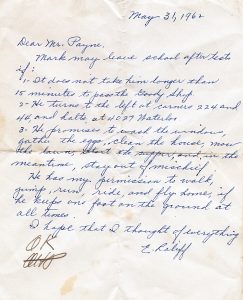
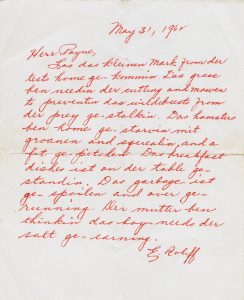
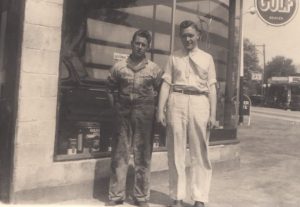
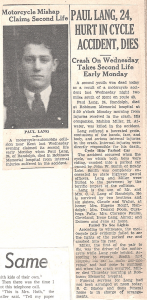
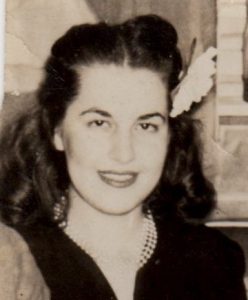

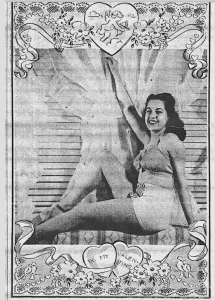
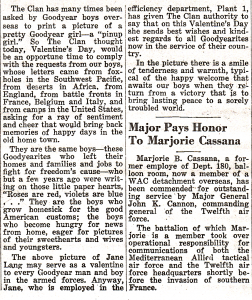
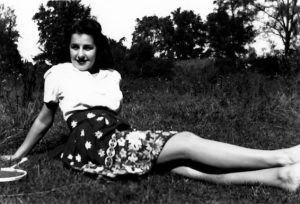
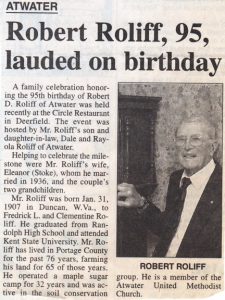
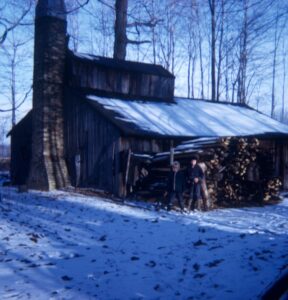
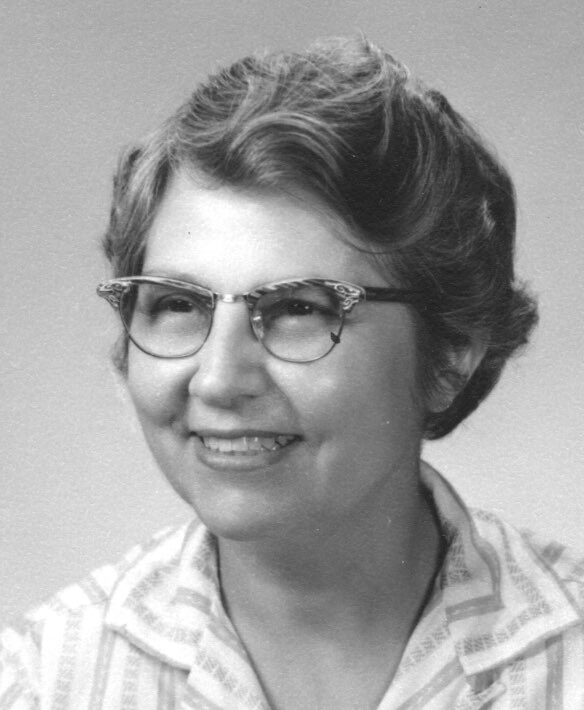


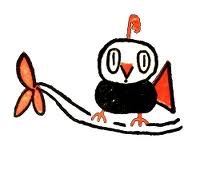 This is a watchbird watching YOU!
This is a watchbird watching YOU!